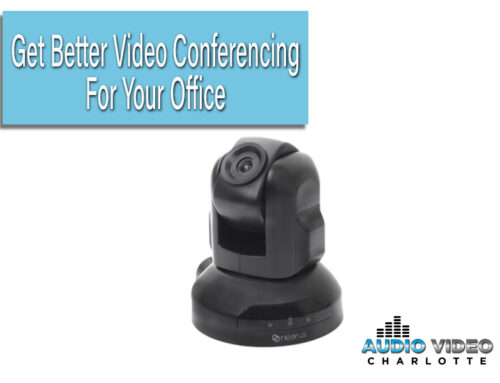
With more people working from home than ever before, internet speeds are beginning to decrease—especially during working hours. Obviously, this can be a major inconvenience when you are communicating with clients or working on a project. Thankfully, there are ways to improve your Wi-Fi speed and Audio Video Charlotte has everything you need to know.
“Is it me or is my internet running slower than it used to?” Do you ever find yourself asking this question? Chances are if you have had the same modem, cables, and/or devices for the past few years you could be running at a reduced speed. Sure, you turned everything off, turned it back on; you unplugged all the wires, let them sit for a minute or so and plugged them back, but nothing seemed to change. So what’s the problem? Well, it could be a number of things.
Ubiquiti routers (access points that broadcast a Wi-Fi network) can be installed around the house to increase speeds; we can even come and hardwire any possible connections; but before we look into any of these options, you need to test your current Wi-Fi speed. From there, we can better assess your situation and figure a way to get you up and running much faster. There are also other router options that can be just as effective such as Linksys or Netgear.
The important thing is not to settle for lagging internet speed. The process of figuring out why your internet is slow may seem daunting, but at Audio Video Charlotte we have found a number of ways to identify the culprit for slow internet, and we are happy to share them with you.
How to Test Your Internet Speed
Testing your internet speed will help determine whether or not you are getting the correct rate. To do this, we recommend downloading the Ookla app and running it at various times of day—paying special note to those times you feel it lags the most.
Once you have recorded the results from running the Ookla speed test, compare them to the rate your internet should be running at. To find this number, do a quick Google search for the preferred rate for your household (number of people using the internet, number of devices connected, etc. all play a part in the rate of speed you should have).
*A quick note: Megabytes refers to the file size and mega bits is the transfer rate for either upload or downloadable
It’s a good idea to contact your internet provider to see what rate of speed your current plan is running. You could find out that you need to upgrade your internet plan in order to increase your bandwidth. Do keep in mind that many internet companies taut huge speeds when, in reality, you will never get close to reaching them, as rates of speeds change depending on your area (so be precise about where you live when asking your internet system provider for the rate you should be getting). Theoretical throughput for most people a good rule of thumb is if you can get half of what you pay for you are definitely heading in the right direction!
Your Next Steps
If the results of the internet speed test show you are running at a low rate, there are a number of things you can do to help diagnose the problem. Here are some problem-solving techniques we recommend trying, but keep in mind that each of these suggestions can be quickly done for you by any of our trained technicians:
- Bad Modem. The most common reason for slow internet speed is a bad modem. As modems get older they grow slower and weaker and they can’t keep up with newer technology. The average lifespan of a modem is three to four years, so if you are running slow, it’s a good idea to either have your current modem tested or to go out a buy a new one. The Netgear N150 is a great option for high speed. If you find your speed is still slow, move on to number two!
- Virus Scan. A lot of times viruses can attach to your computer and eat away at your system’s resources, causing the device to run slower than usual. The scary part is there can be a number of viruses living in your computer without you even knowing it. To solve this problem, download a virus-scan software such as TotalAV or Scanguard (both are free) and follow the steps to sweep your computer clean if a virus, or viruses, are found. Once this process is complete, see if your internet runs faster.
- On-System Interference. Sometimes the programs we download to our computers can actually interfere with internet speed. This is especially frustrating because it can be difficult to tell if this is happening at all—and if so, which program is causing the problem. Our recommendation for those who have made it to this stage and still find they are running at slow speeds is to have one of our technicians come in and run a diagnostic test. This test will show if you have any on-system interference and you can then take the necessary steps to fix the issue.
- Try Plugging In. Having Wi-Fi access is great, as you can get a connection around, inside and out, of your home. Though it is convenient, wireless internet tends to be a bit slower than if you directly plugged into your modem. Here’s our suggestion: try plugging into your modem and see if that computer’s internet runs any faster. If there is a significant difference in speed, that means your Wi-Fi is not reaching your computer as it should. From here, we can send out a technician to find where this loss in connection is residing and fix the issue as quickly as possible.
- Like modems, old cables can cause problems. Even the length of your cables can affect speeds. Try replacing old cables and lines, either to your computer, router, phone, etc. with new ones that are shorter and updated to handle your level of bandwidth.
- Router/Modem Software Update. Many people do not realize that their router and modem have imbedded software that needs to be updated regularly. Follow your modem’s instructions (the process varies by brand) for updating. If you have a Netgear modem you need to go to http://routerlogin.com. Here, you can update and tweak your settings to best fit your usage. It is also a good idea to update your computer’s desktop version, operating system, etc. whenever you notice the internet speed slower.
- Line Test and Investigation. If all else fails, contact your internet service provider and ask for a line test and investigation. Usually, the provider will send out a worker to check your external and internal wiring. Oftentimes, the culprit for slow internet is chewed wires or faulty connections. These things happen over time and are an easy fix—though your internet company will probably charge you a fee for having someone come out. If you find this service is not free-of-charge through your provider, contact us and we will be sure to find and fix the issue.
Let Us Help You Work From Home
Whether you are simply working from home these days or you are setting up your own virtual business, we can help in three important areas: Set-Up, Support, and Installation.
Setting up your home office can be relatively simple or quite complicated, depending on the type of work you will be doing virtually. Will you need a webcam—maybe one that’s a few steps up from the one built into your computer? How is the lighting in your home office, too bright or not bright enough? Along with setting up backdrops and connecting sound equipment, these are the most common aspects of setting up your office.
Once your office is in place you then need to know how to use it. Zoom, Go-To Meeting, and Amazon Show are a few of the most commonly used office programs these days, but there are tons more. Keeping up with all these programs and apps can be difficult, but a quick call to Audio Video Charlotte is all it takes.
Installing heavy, complex equipment can be difficult and time-consuming, so don’t do it alone. Give us a call at 704-287-3334 and we will come set everything in place for you.
Don’t let slow internet speeds keep you from running your home office at its best. Contact us at Audio Video Charlotte today and let us assess your situation, find any issues, and resolve them.




